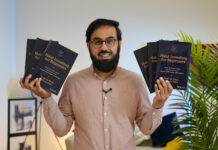As Qatar’s emir prepares to hand power to his son Sheikh Tamim, Roshan Muhammed Salih argues that after a promising start Hamad bin Khalifa al Thani has tarnished his nation’s reputation.
The ruler of Qatar used to be my employer – I worked for him for a few years when I was an employee of Aljazeera in Doha. Qatar’s ruling family effectively owns the world famous TV station.
As I was making my way to my job interview I still remember seeing American helicopters taking off from the al Udeid air base on their way to do their dirty work in Iraq. I was very uneasy about that as were many of my fellow journalists. The western invasions and occupations of both Iraq and Afghanistan would have been much more difficult without Qatar’s assistance.
But back in 2003 Aljazeera was a genuinely exciting project that was (overall) a force for good in the Arab world; a force that promoted democracy, openness and accountability. So we swallowed our pride and hypocritically turned a blind eye to the huge US air base that projected American power across the region that we all lived next to.
Popular leader
Hamad bin Khalifa al Thani was without doubt a popular leader among Qataris, who number only around 20 per cent of the overall population. The other 80 per cent are virtual slaves for the pampered indigenous population who have few rights and generally hate the natives. What they thought of the ruler (who is in effect an absolute dictator) I have no idea because they were never stupid enough to tell me.
But there’s no doubt that Hamad has been a remarkable, visionary leader since he overthrew his own father in 1995 in a palace coup. He has overseen the transition of Qatar from a sleepy backwater to a major regional and even global player. He has done this by using the vast gas and oil reserves that God has gifted the tiny nation.
Subscribe to our newsletter and stay updated on the latest news and updates from around the Muslim world!
Aljazeera’s Arabic station put Qatar on the map by introducing relative professionalism and genuine debate to the Arab airwaves. It was generally the voice of Arab public opinion during the “war on terror” years, and its owners allowed it remarkable freedom to report on anything but Qatar itself.
Mediation
Qatar further increased its prestige by making contact and alliances with a vast array of competing groups and nations – such as the West, Iran, Israel, Hamas, Hezbollah, al Qaeda and the Taliban. It increased its cachet by mediating between these enemies and competing factions.
Meanwhile, at home living standards soared, construction boomed and the natives and a minority of privileged expats led a close-to-perfect existence in their Arab Disneyland (the majority – mainly south Asians who actually built the country – continued to live in misery).
Qatar started to invest heavily across the Arab world and beyond. It hosted a number of prestigious sporting events and won the right to host the 2022 World Cup.
Across the Arab world Hamad was admired if not always loved. He seemed to have checkmated all his potential critics. Those who opposed the US air base (Islamists and leftists in the main) wouldn’t criticise him because Aljazeera gave them airtime. And those who were against Aljazeera (the West) wouldn’t criticize him because he co-operated with them militarily and politically. It was a clever double game.
Arab Spring
But something started to go wrong sometime before the launch of Aljazeera English in 2007 and especially after the Arab Spring. Qatar’s foreign policy started to become more explicitly pro-western as illustrated by Aljazeera English itself which looked and sounded very much like a western TV channel.
And after the welcome revolutions in Tunisia and Egypt Aljazeera started to completely lose the plot and let its success go to its head. A channel which used to reflect Arab public opinion became a TV station which manipulated Arab public opinion.
Qatar and Aljazeera aligned themseves with American foreign policy directly or indirectly by opposing revolution in Bahrain, supporting Nato intervention in Libya and, most notably, stoking war and sectarianism in Syria.
And as Qatari foreign policy became more and more a mirror of western foreign policy Hamad was seen by many as the West’s main man in the region, and Aljazeera was seen as a tool for destablizing Arab societies.
So as he prepares to hand power to his son Hamad’s only supporters seem to be the West and the Muslim Brotherhood (which he allegedly bankrolls.) As for the Shia world and the leftists, they detest him. And the Islamist jihadis remain very wary of him but have tactically chosen not to oppose him for now because of the support he gives them.
A tarnished legacy indeed for his son, the 33 year old Sheikh Tamim, to inherit.
@RMSalih


















